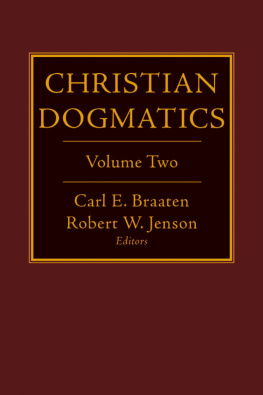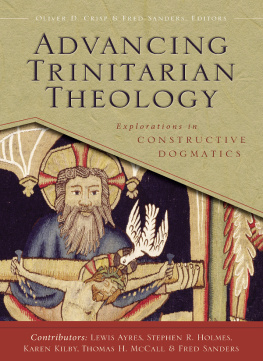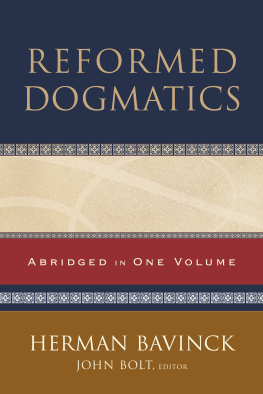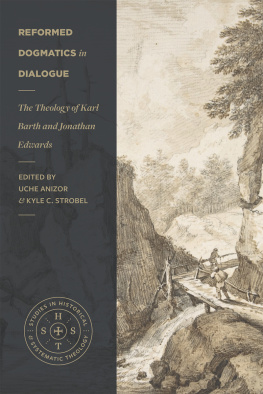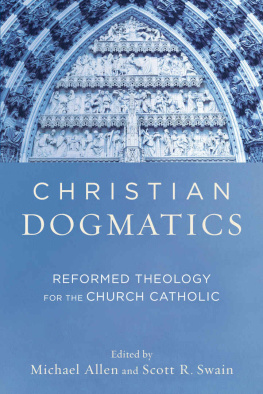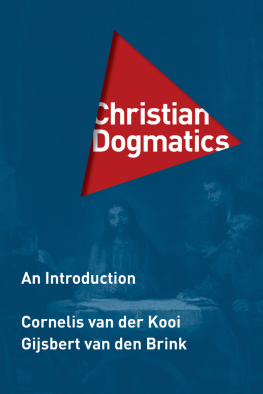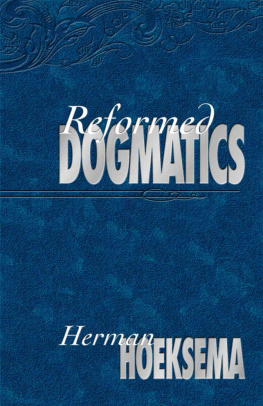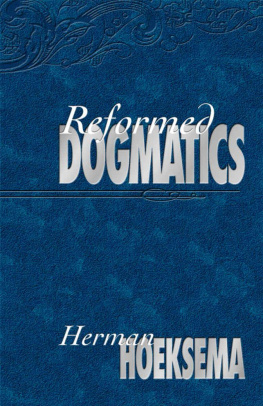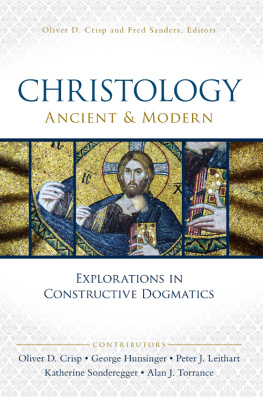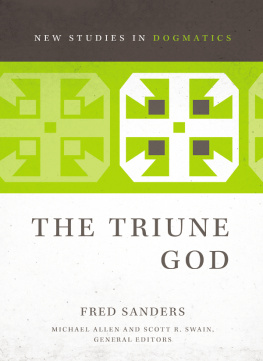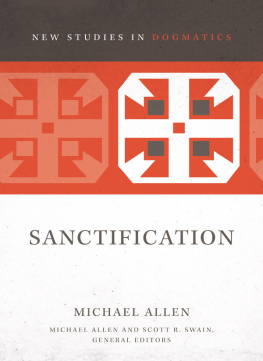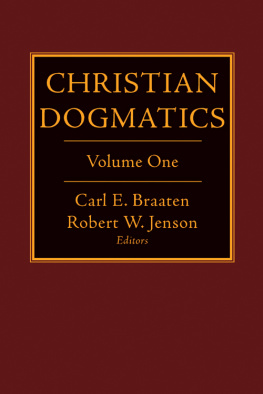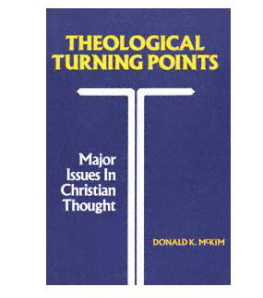
Christian Dogmatics
Contributors
Carl E. Braaten is Professor of Systematic Theology at the Lutheran School of Theology at Chicago, Illinois.
Gerhard O. Forde is Professor of Systematic Theology at Luther Northwestern Theological Seminary in St. Paul, Minnesota.
Philip J. Hefner is Professor of Systematic Theology at the Lutheran School of Theology at Chicago.
Robert W. Jenson is Professor of Religion at St. Olaf College, Northfield, Minnesota.
Hans Schwarz is Professor of Protestant Theology at the University of Regensburg, Federal Republic of Germany.
Paul R. Sponheim is Professor of Systematic Theology at Luther Northwestern Theological Seminary in St. Paul, Minnesota.
VOLUME 2
Christian Dogmatics
Carl E. Braaten, editor
Gerhard O. Forde
Philip J. Hefner
Robert W. Jenson, editor
Hans Schwarz
Paul R. Sponheim
FORTRESS PRESS
PHILADELPHIA
CHRISTIAN DOGMATICS
Volume 2
First Fortress Press paperback edition 2011
Copyright 1984 Fortress Press. All rights reserved. Except for brief quotations in critical articles or reviews, no part of this book may be reproduced in any manner without prior written permission from the publisher. Visit http://www.augsburgfortress.org/copyrights/ or write to Permissions, Augsburg Fortress, Box 1209, Minneapolis, MN 55440.
Scripture quotations, unless otherwise noted, are from the Revised Standard Version Bible, copyright 1946, 1952, 1971, 1973 by the Division of Christian Education of the National Council of the Churches of Christ in the USA and are used by permission. All rights reserved.
ISBN 978-0-8006-9869-0
eISBN 9781451404791
The Library of Congress cataloged the hardcover edition as follows:
Library of Congress Cataloging-in-Publication Data
Christian dogmatics.
Includes index.
1. Theology, Doctrinal. 2. Lutheran Church
Doctrines. I. Braaten, Carl E., 1929
II. Jenson, Robert W.
BT75.2.C48 1984 230.41 83-48007
ISBN 0-8006-0712-0 (set)
ISBN 0-8006-0703-1 (v. 1)
ISBN 0-8006-0704-X (v. 2)
Contents
VOLUME 2
by Gerhard O. Forde
by Robert W. Jenson
by Philip J. Hefner
by Hans Schwarz and Robert W. Jenson
by Hans Schwarz
by Robert W. Jenson
by Gerhard O. Forde
by Hans Schwarz
Abbreviations in Volume 2
The abbreviations used in this volume, as given below, are with slight variations based on Siegfried Schwertner, Internationales Abkrzungsverzeichnis fr Theologie und Grenzgebiete (Berlin and New York: Walter de Gruyter, 1974).
| AASF | Annales academia scientiarum Fennicae |
| AGTL | Arbeiten zur Geschichte und Theologie des Luthertums |
| AHC | Annuarium historiae conciliorum. Amsterdam, 1969ff. |
| BC | The Book of Concord: The Confessions of the Evangelical Lutheran Church. Translated and edited by Theodore G. Tappert. Philadelphia: Fortress Press, 1959. |
| BHH | Biblisch-historisches Handwrterbuch. 3 vols. Ed. Bo Reicke and Leonhard Rost. Gttingen, 196266. |
| CR | Corpus reformatorum. Berlin, 1834ff. |
| CTM | Concordia Theological Monthly |
| EvTh | Evangelische Theologie |
| FL | Fontana Library |
| HDG | Handbuch der Dogmengeschichte. Freiburg, 1956ff. |
| Interp. | Interpretation: A Journal of Bible and Theology |
| KuD | Kerygma und Dogma |
| LW | American Edition of Luthers Works. St. Louis: Concordia Publishing House; Philadelphia: Fortress Press, 1955 |
| NPNF | A Select Library of the Nicene and Post-Nicene Fathers of the Christian Church. Oxford, 1887ff. |
| RGG3 | Die Religion in Geschichte und Gegenwart. 3d ed. Tbingen, 195665. |
| TDNT | Theological Dictionary of the New Testament. 10 vols. Edited by Gerhard Kittel and Gerhard Friedrich. Grand Rapids, 1964ff. |
| THAT | Theologisches Handwrterbuch zum Alten Testament. Edited by Ernst Jenni and Claus Westermann. Munich, 1971ff. |
| ThLz | Theologische Literaturzeitung |
| TS | Theological Studies |
| TU | Texte und Untersuchungen zur Geschichte der altchristlichen Literatur. Berlin, 1882ff. |
| UUA | Uppsala universtets arsskrift |
| UnSa | Unam Sanctam |
| VigChr | Vigiliae Christianae |
| WA | D. Martin Luthers Werke. Kritische Gesamtausgabe. Weimar, 1883ff. |
| WA Br | D. Martin Luthers Werke. Briefwechsel. Weimar, 1930ff. |
| WA DB | D. Martin Luthers Werke. Deutsche Bible. Weimar, 1906ff. |
| ZKTh | Zeitschrift fr katholische Theologie |
| ZThK | Zeitschrift fr Theologie und Kirche |
| ZNW | Zeitschrift fr die neutestamentliche Wissenschaft |
GERHARD O. FORDE
THE WORK OF CHRIST
Therefore, if any one is in Christ, he is a new creation; the old has passed away, behold, the new has come. All this is from God, who through Christ reconciled us to himself and gave us the ministry of reconciliation; that is, in Christ God was reconciling the world to himself, not counting their trespasses against them, and entrusting to us the message of reconciliation. So we are ambassadors for Christ, God making his appeal through us. We beseech you on behalf of Christ, be reconciled to God. For our sake he made him to be sin who knew no sin, so that in him we might become the righteousness of God. ()
So reads a central New Testament passage on the work of Christ which can stand as a theme for this locus. We are concerned here with what God did in Jesus Christ, with the work rather than the person of Christ. The distinction cannot be made absolutely. In the broadest sense, Christ is what he does and does what he is. Dogmatic convention has made the distinction, however, and it is useful to continue it, if for no other reason than that so much curiosity and effort are invested usually in the dogma of Christs person that his work would be shunted off into a few remarks and footnotes were the two doctrines treated together. So with the caveat that person and work should not and cannot ultimately be separated, we treat here that part of the dogmatic tradition which has dealt with the work of Christ.
There is no official dogma of the work of Christnot in the sense in which one could speak of the dogmas of the Trinity, of the person of Christ, or even of justification in the churches of the Reformation. At best, one can speak of certain dominant doctrines, views, or motifs in different epochs. Yet the tradition bears witness to the tenacity with which the church has accorded a central place to Christs work. The churches of the Reformation, for instance, have looked on that work as the chief article on which everything rests,
The statement from the Augsburg Confession points to the major question for this locus: Cur deus homo? Why did God become a human person in the particular way manifest in the actual story of Jesus? What is accomplished thereby? What does Jesus do? We are concerned about the action and the passion of Jesus and what results from them, as distinguished from his being. Why must he be crucified and raised? If it is a doing, a work of Christ, and not just a being with which we are concerned, then it must have some result, some effect. What is that effect, and why is there just this form of doing to achieve it?
Next page
